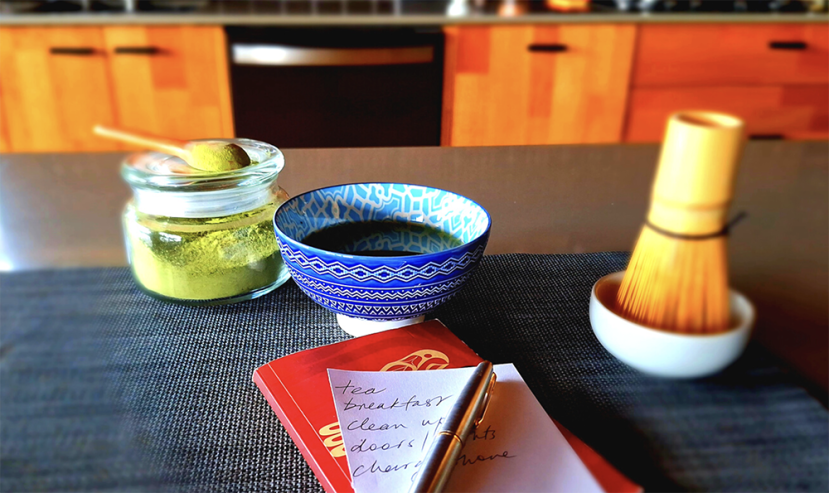October - The Gift of Routines
October 19th, 2023 Guest Posts

The gift of routines by @suek
========
I used to totally reject routines. I considered myself a creative free spirit, thriving on excitement and spontaneity, interest, novelty. I lived life exactly how it was served up. I wanted to be delighted and surprised with life. To hell with routines. They were boring, stupid, proof of a dull and uninteresting life.
I have to admit, my life back then was kind of exciting, spontaneous, full of surprises. But in a chaotic, exhausting, out-of-control kind of way.
Here’s what my home life looked like much of the time: piles of unopened mail, piles of unwashed clothes, piles of unfinished art projects, piles of unfinished books, piles of fizzled-out writing projects, tangled unmade bed, damp towels, expired food. I was “coping” with all of this excitement/mess by drinking. Often, and a lot. I was also working every day, socialising many nights, burning the candle at all ends. I knew I had to do something. But what? I wasn’t ready to give up drinking. But I thought maybe I could try to get a bit better organised.
Getting over the resistance
When I make a decision to do something big in my life (eg. get sober, get fit, get organized, whatever) I go online and look for help. This is how I met Mrs D back in October 2012 when I was 2-days sober and very fragile. I am eternally grateful for that shakey, tearful Google search!
When I decided to get organized, I found Flylady. If you want a serious kick in the pants, try her out. This woman means business, and she will push and cheer you on relentlessly. Her website and emails are full of resources and encouragement to get organized.
There are loads of other online resources. If you have found one you like, why not share it in the comments and tell us how it works for you.
My point here is: Get Help. Sign up to something that will give you resources, encouragement, and some measurable way of making progress.
Redefine the rut
I was convinced that routines would be a boring rut. They Are Not! I have learned that routines are the key to freedom and peace. That is a massive claim, but for me it’s the truth.
If I follow a simple evening and morning routine, I gift myself:
· A peaceful feeling of “everything’s taken care of”
· Better sleep
· Knowing where my things are, not wasting time scrambling to find things
· Regular and healthier eating
· A more peaceful and orderly relationship, with fewer misunderstandings
I have overcome my resistance to routines by telling myself: your routines are simply the default minimum investment you make each day to have peace and freedom in your life.
Yes, routines are an investment. I don’t have to do them. But I know the cost of letting them drop. It’s my decision. But usually, if I can’t think of something better to do, I do my evening and morning routines, because I really want a peaceful life!
My routine
Everyone will have their own routines that suit them. I share mine just to show you how simple they can be. Just like a small amount of regular savings, the investment grows over time. These activities become a rhythm, rather than a rut.
Evening
The evening routine is really just a set-up for a peaceful wake up in the morning. Basically if you donˋt wake up to disorder and chaos, the day will be a whole lot better.
· Make sleepy tea, and make overnight oats or chia cereal for tomorrow’s breakfast.
· Wash and clear dishes. Wipe counters.
· Do a quick scan for bits and pieces lying around the house. Put them away.
· Check doors and gates are shut, lights etc. are turned off.
· Turn off devices and charge overnight.
· Get changed. Put todayˋs clothing in the laundry hamper, or fold/hang up for another wear. Put shoes away.
· Clean teeth, wash and moisturize face, moisturise hands.
· One small self-care treatment — eg. a face massage, foot scrub. Optional, but encouraged.
· Time for bed.
Morning
Morning is a bit more involved, as it’s setting me up for the day ahead. But starting with a fairly clear slate – an empty kitchen sink, wiped counter, breakfast ready in the fridge, and a fully-charged phone – is a great start.
· Get up, wash face, moisturise, clean teeth.
· Make tea.
· Meditate.
· Breakfast.
· Water plants on terrace.
· Get dressed, make bed, pick up bits and pieces in bedroom.
· Check my calendar, messages and emails, and deal with any quick bits and pieces. Make a to-do list for today.
· What’s For Dinner? Quick check-in with the hubs about meals. Who’s cooking? What are we having? Do we need to shop for anything? Whoˋs doing the shopping? This is a 2-minute habit that is gold for removing stress and guess-work around the evening meal. And sharing the cooking load!
· Whatˋs happening today? Quick check-in with the hubs about plans and commitments for the day. Just so we know whatˋs happening, whoˋs doing what, removing surprises and assumptions.
Now Iˋm ready to get on with the rest of the day.
(Full disclosure, I am retired now, and my life is pretty simple. I know some people are juggling families, jobs, and major commitments outside their own needs. A routine is going to help you, however complicated or simple your life is.)
Making routines stick
Be realistic. Try a few small things at a time. See what works for you, what doesn’t. Adjust to your own situation. Just don’t try to do to much. Start with the bare minimum you know you have to do, and build from there once the routine is established.
Write it down. That way you have something to remind you, keep you on track, and a sense of satisfaction when you have done these small things for yourself, as an investment in your peace. Writing something down is a great way to set the intention in motion. Referring to a written list is a really good way to tweak that list. You’ll be able to see things you really don’t need to have on your list, or notice when you need to add an item. It’s a work in progress (just like we all are).
Notice and note the changes. Remember when we first get sober, we notice small changes over time, things that show our lives are getting better. For me it was seeing the whites of my eyes get whiter and whiter the longer I stayed away from alcohol. Also that feeling of having plenty of time to spend on things I actually enjoyed, rather than getting lost in a boozy fog.
With routines, I noticed a whole lot more time open up. I knew where things were, so didn’t waste time constantly scrounging around for things I’d lost. I noticed that the household felt more harmonious and calm. I had a sense of achievement when I got into bed, knowing I was prepared in some ways for tomorrow. Knowing I’m taking care of myself in this important way.
These are things to add to your gratitude journal. Like any sound investment, they will compound and deliver dividends.
What do you do to keep your life in order? Do you subscribe to any online resources? What advice would you give to someone who still thinks routines are a boring inconvenience? Let us know in the comments.
Continue reading
Central Otago Speaking Events..
So this is cool – I’ve been invited down to Central Otago to speak at a series of events in late October.
September 21, 2014
When is a newbie no longer a newbie?!
Someone asked in the Members Feed a while back “When do you stop being a newbie?”.
March 2, 2015
Sober Story: Aria
This week’s Sober Story comes from Aria, a 65-year-old woman living in the Bay of Plenty.
July 15, 2020
Up up into the giant sky
Some of you may remember that my dear friend (and long-time member of this site) @suek has recently been attending a memoir writing course.
March 18, 2015
